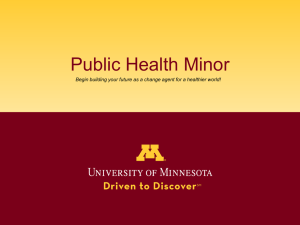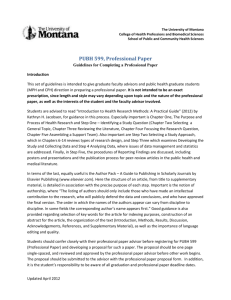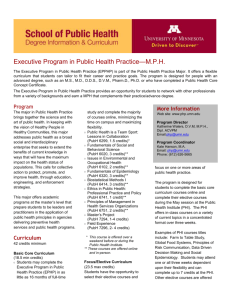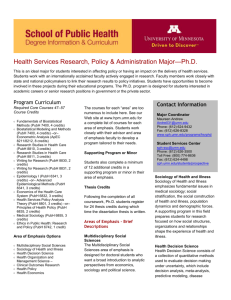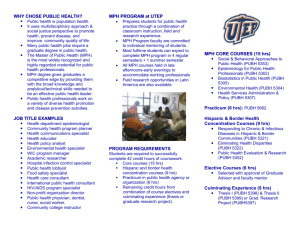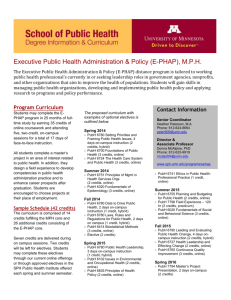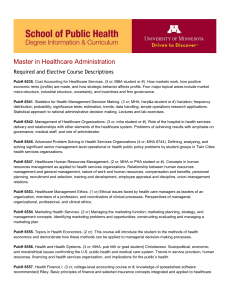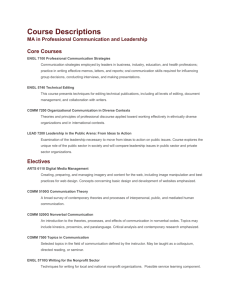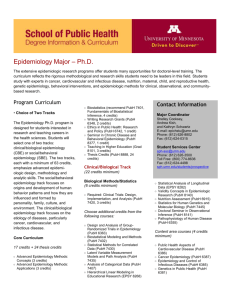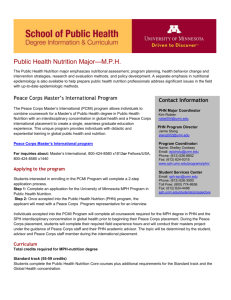Approved Public Health Elective Courses
advertisement
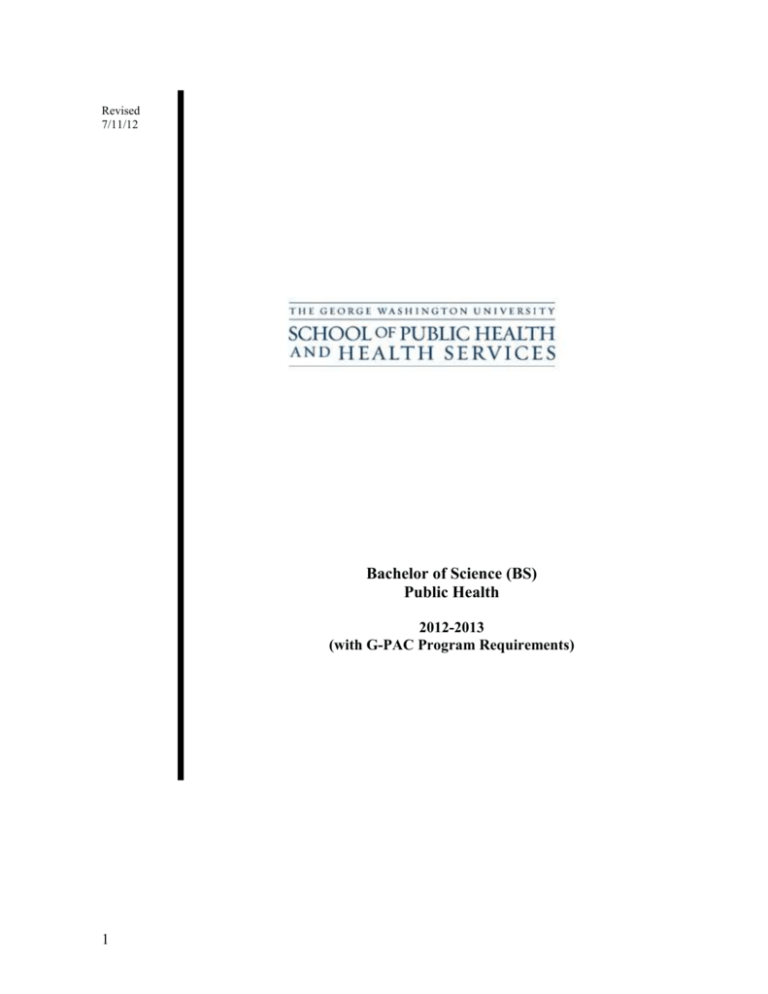
Revised 7/11/12 Bachelor of Science (BS) Public Health 2012-2013 (with G-PAC Program Requirements) 1 School of Public Health and Health Services Bachelor of Science in Public Health 2012-2013 (With G-PAC Program Requirements) Program Advisor Julia Butler-Mayes, M.Ed., 2175 K St., Suite 500, jmbm@gwu.edu , 202-994-0251 Program Director Sara Wilensky, J.D., Ph.D., 2021 K St., Suite 800, wilensky@gwu.edu, 202-994-4126 Admissions Julia Watts, 2175 K St., Suite 500, jlwatts@gwu.edu, 202-994-2160 Background The George Washington University School of Public Health and Health Services (SPHHS) first offered the BS Public Health fall semester 2003. SPHHS was established in July 1997, bringing together three long-standing University programs, and is fully accredited by the Council on Education for Public Health (CEPH). The School educates over 800 students at the undergraduate, graduate, and doctoral levels, and comprises seven academic departments and four research centers. Since its inception, SPHHS has offered several undergraduate degrees and programs, including the Bachelor of Science in Exercise Science, the Bachelor of Science in Athletic Training, the Secondary Field of Study/Minor in Exercise Science, the Secondary Field of Study/Minor in Public Health, and the Concentration in Global Health in conjunction with the Elliott School of International Affairs. To learn more about SPHHS, visit http://www.gwumc.edu/sphhs/ . Learning Objectives in the Liberal Arts Tradition The BS in Public Health, founded in the liberal arts tradition often associated with small, private colleges, is a respected and proven model for teaching students to assume responsibility for their own life-long learning. Liberal arts education has its foundation in both the arts (trivium, based on three disciplines: language, logic, and rhetoric) and the sciences (quadrivium, based on four disciplines of natural phenomena: arithmetic, geometry, astronomy, and music) as studied in medieval universities. While contemporary arts and sciences programs have expanded beyond the imagination and expectations of the medieval founders, it is within the context of this liberal arts tradition that the BS in Public Health strives to prepare students for progressive independence, maturity, knowledge of the world, understanding of diverse inhabitants, and respect for their differing points of view. Because this degree is intended to convey technical detail and analytic skills, but with a liberal arts philosophical base, it also has the educational objectives of nurturing critical thinking, analysis, and synthesis of information, and recognizing the historical and societal associations of current trends in public health and health care delivery. Core Course Competencies The following competencies are designed to be achieved by all public health majors through the indicated courses: Upon completion of the Bachelor of Science in Public Health, students will be able to: 1. Assess the impact of historical, cultural, political, environmental, behavioral, and socio-economic factors on population/community health and health status (courses: 1101, 1102, 2111, 2112, 3132, 3133, 3135). 2. Describe the organization, financing, and delivery of health services and public health systems (courses: 1101, 3130, 3133, 3135, 4140). 3. Describe the underlying scientific principles relating to public health and health care issues and discuss how these principles inform interventions to improve individual and population health (courses: 1101, 2112, 2110, 2111, 3131, 3132, 3133,4140). 4. Critically review multiple types of research, develop an understanding of data and research, and develop and evaluate public health interventions based on available evidence (courses: 2111, 3131, 3133, 4140). 2 5. Evaluate policy, behavioral, environmental, and systems options for addressing current public health and health care concerns (courses: 2112, 3130, 3132, 3133, 3135,4140). 6. Prepare written and oral communication to convey public health concepts and analysis clearly and persuasively (all courses). 7. Use an interdisciplinary approach to develop and evaluate public-health research interventions based on current evidence (courses: 4140). Careers The BS in Public Health strives to increase awareness and understanding of public health principles among students who are preparing for professional careers in fields such as: Allied Health Business Health Education Health Services Administration Law Medicine (or another of the health professions) Public Health (both those who plan to pursue graduate degrees in public health or students who intend to pursue entry-level jobs in specific sectors of public health, health services, or public policy for which bachelor's level education is appropriate). Admissions Requirements Julia Watts, Executive Associate Admissions and Recruitment School of Public Health and Health Services 2175 K St., Suite 500 Washington, D.C. 20037 Fax: 202.994.1850 Phone: 202.994.2160 Email: jlwatts@gwu.edu In order to declare the BS in Public Health major, students must: 1. Receive guidance from the SPHHS Admissions Director; and 2. Submit a Transfer Application from Within GW form to the SPHHS Office of Admissions; and 3. Your resume, and 4. Submit 250 word responses to the following two questions: What public health issue concerns you most and why? What role will the public health major play in your goals to become a lifelong learner? 5. Be accepted into the program. No student is considered to have declared a major until this process is completed and the student has received a letter of acceptance from the SPHHS Office of Admission. Thereafter, the student receives academic guidance from an advisor in SPHHS, and must continue to receive academic guidance from the advisor in the major field in order to register for all subsequent semesters. Since space, equipment, and other requirements compel the program to limit the number of students in the major, admission to the major may be on a selective or space available basis. Admissions decisions are announced after the student reaches junior status upon the completion of 60 credits. The curriculum that accepted students follow is the curriculum effective for the academic year in which the student matriculates into the BS Public Health program. A minimum 3.0 grade point average and junior status (60 credits) are required for admissions consideration. 3 Application Deadlines Fall Admission Applications are due on March 1st. Late or incomplete applications will not be considered. It is the intention of the admissions committee to make final admission decisions prior to registration for fall classes. Academic Degree Requirements for Graduation* There are three categories of Degree Requirements: General Curriculum Requirements (G-PAC), Public Health Core Courses, and Public Health Electives. Students take other electives to total the 120 credits required to graduate. A. G-PAC Requirements (28-34 credit hours) Students are required to complete a minimum of 24 credit hours of analytical course work distributed across a range of disciplines in the following manner. Courses taken to fulfill G-PAC components can also be counted toward a major or a minor. PERSPECTIVE Courses that meet learning objectives for the category of Perspective can double count with courses taken toward the Analysis requirement. Global or Cross-Cultural Local or Civic Engagement ANALYSIS Mathematics or Statistics- 3 credit hours in an approved mathematics or statistics course to achieve learning goals for quantitative reasoning. Public Health students recommended to take STAT 1127. Natural/Physical Sciences with lab- 6 credit hours in approved natural and physical sciences courses (must include a lab component) to achieve learning goals for scientific reasoning. Social Sciences- 6 credit hours in approved social sciences courses to achieve learning goals in quantitative, scientific, critical or creative thinking. Humanities- 6 credit hours in approved humanities courses to achieve learning goals in either critical or creative thinking Arts- 3 credit hours in an approved arts course (visual, performing, critical, or historical practices) to achieve learning goals in either critical or creative thinking. COMMUNICATION Students are required to demonstrate both written and oral communication skills. Courses taken to meet this learning objective can be double counted with courses taken toward Analysis and/or Perspective requirements. Written Communications- Students must take UW 1020 in their freshman year plus two (2) Writing in the Discipline (WID) courses. Students must successfully complete UW 1020 before taking WID courses in order to receive credit for the Written Communication requirement. One WID course can double count with courses taken to count toward Analysis or Perspective requirement. Oral Communications- Of the G-PAC analysis/perspective courses, or selected from a course required from the student’s major students must take one approved course that includes a component of oral communication. Transfer credit and credit by examination (AP, IB, etc.) cannot be used to fulfill any part of the G-PAC requirements. Students should consult with Advisors with specific questions. 4 SPHHS follows the GW Columbian College of Arts and Sciences G-PAC Requirements* with the following specifications: 5 Students must take either BISC 1005, BISC 1111 or equivalent (with approval from the PubH 2110 instructor) as a pre-requisite to taking Public Health Biology (PubH 2110) Students must take one semester of statistics (STAT 1127 is preferred) as a prerequisite for Epidemiology (PubH 3131). Students must take Econ 1011 or equivalent (with approval from the PubH 3130 instructor) as a pre-requisite to taking Health Services Management and Economics (PubH 3130). B. Public Health Core Courses (33 credits, 11 courses) The public health major curriculum constitutes 42 credits: 33 core credit credits and 9 elective credit credits offered through SPHHS. Public Health Core Courses Required Courses Credits Title PubH 1101 3 Introduction to Public Health and Health Services PubH 1102 3 History of Public Health PubH 2110 3 Public Health Biology PubH 2111 3 Introduction to Preventive Medicine PubH 2112 3 Principles of Health Education and Health Promotion PubH 3130 3 Introduction to Management and Economics of Health Services PubH 3131 3 Epidemiology: Measuring Health and Disease PubH 3132 (W option) 3 Health and Environment PubH 3133 3 Global Health and Development PubH 3135-W 3 Health Policy PubH 4140-W 3 Senior Seminar C. Public Health Elective Courses (9 credits) Approved Public Health Elective Courses Elective Courses HLWL 1103 HLWL 1104 HLWL 1106 HLWL 1109 HLWL 1110 ExSc 1110 ExSc 1111 ExSc 1118 ExSc 2113 ExSc 2119 EHS 1040 EHS 1041 EHS 2108 Hist 3363 Anth 3504 Anth 3513 Anth 6302 HSCI 2101 PubH 1099 PubH 2113 PubH 2114 PubH 2115 PubH 2116 PubH 2117 PubH 3134 PubH 3136 PubH 3190 6 Credits 3 3 3 3 3 4 4 3 3 3 3 1 3 3 3 3 3 3 Var 3 3 3 3 3 3 3 1-3 Title Issues in Men’s Health Outdoor and Environmental Education Drug Awareness Human Sexuality Issues in Alternative Medicine Applied Anatomy and Physiology I Applied Anatomy and Physiology II Sport and Nutrition Kinesiology Basic Nutrition Emergency Medical Tech – Basic Emergency Medical Tech – Lab Emergency Medical Clinic Scribe Race, American Medicine, and Public Health: African-American Experiences Illness, Healing and Culture Human Rights and Ethics Issues in Development Psychosocial Aspects of Health and Illness Variable Topics Impact of Culture Upon Health Environment, Health and Development Health, Human Rights, and Displaced Persons Global Delivery of Health Services Service-Learning in Public Health International Public Health Practice Health Law Various Topics in Public Health Expectations of Students/Policies 1. Follow the admissions process outlined above; 2. Consult an SPHHS advisor prior to registration (The advisor should be consulted before registration concerning the student’s program of courses; the entire program, including electives, must be approved by the advisor. The student is also expected to consult a program advisor in all matters affecting the program of studies, such as changes, substitutions, or withdrawals); 3. Earn 120 credits within the established course distribution outlined below: Category G-PAC Requirements Public Health Core Curriculum Public Health Electives Additional Electives Total Number of Credits Summary Credit Distribution Chart Credits 28-34 33 9 44-50 120 Premedical Credits 52-71 33 9 7-26 120 4. No course may fulfill a requirement in more than one of the seven G-PAC categories (exception: An occasional WID course may fulfill more than one G-PAC category); 5. Students may also fulfill credit requirements in the following ways: 1. transfer credit for equivalent courses from an accredited institution; 2. credit earned by means of AP, IB, or other nationally approved examination programs; or 3. by waiver examinations such as SAT II or ACT subject tests, except in foreign languages. (See Advanced Standing and Advanced Placement under Admissions in the GW Undergraduate Bulletin); 6. Two courses that are related in subject matter may not be taken to fulfill a requirement (Consult the GW Undergraduate Bulletin in the Course Instruction section to identify courses that are equivalent); 7. Students may not take required courses outside of GW except with permission of the Director of the Undergraduate Program in Public Health. Permission will only be granted if there are strong extenuating circumstances that call for an exception to this policy. 8. It is the student’s responsibility to understand the degree requirements and follow them for on-time graduation. 9. Comply with policies and procedures as outlined in the SPHHS Student Handbook and the GW Undergraduate Bulletin. Pay particular attention to the SPHHS requirements to complete human research training, to complete 8 hours of professional enhancement activities, and to pass the Academic Integrity Quiz. Please consult the SPHHS Office of Admissions, 2175 K St., Suite 500, Washington, DC 20037; asksphhs@gwu.edu; 202.994.2160 for further information about the Bachelor of Science (BS) in Public Health. 7 BACHELOR OF SCIENCE – PUBLIC HEALTH PROGRAM-AT-A-GLANCE 2012-2013 General Curriculum Courses Note: See CCAS website for most up-to-date version of G-PAC requirements: http://columbian.gwu.edu/sites/default/files/u11/GPAC%20worksheet%20%2B%20course%20list%208.26.2011.pdf And consult with your Advisor. Courses may count toward more than one requirement as noted below. G-PAC Course Listings Analysis: Mathematics or Statistics Analysis: Natural/Physical Sciences with lab Analysis: Social Sciences Analysis: Humanities Analysis: Arts Perspective: Global or Cross-Cultural Perspective: Local/Civic Engagement Communication: (Written & Oral) Credits MATH 1007, 1009, 1051, 1221, 1231,1232, 1252, 2233 STAT 1051, 1053, 111, 1127 (1127 preferred for Public Health Students) ANTH 1011, 3412 ASTR 1001, 1002 BISC 1005, 1006 CHEM 1003, 1004, 1111, 1112 GEOG 1002 GEOL 1001, 1002, 1005, 1006 (1001 & 1005 considered same course) HONR 1033, 1034, 2175 (Topics Chemistry), 2175 (Science for non-science majors) PHYS 1011, 1021, 1022 ANTH 1002, 1003, 1004, 2008, 3838 COMM 1025, 1041 ECON 1011 GEOG 1001 HONR 2047 PSC 1001, 1002, 2120 PSYC 2011, 2012, 2013, 2014 SMPA 1050, 2101, 2102 SOC 1003, 2101, 2102, 2103, 2104 SPHR 1084 AMST 1050, 1160, 2010, 2011, 2120, 2320, 2350, 2380, 2410, 2440. 2490, 2710, 2730, 2750, 3352 CHIN 3111, 3112, 3123, 3124 ENGL 1320, 1330, 1340, 1410, 1411, 1510, 1511, 1610, 1611, 1710, 1711 FREN 3100, 4540 GER 2091, 2092, 2161, 2162 GREK 1001 HIST 1121, 1310, 1311, 2010, 2011, 2320, 2350, 2380, 2410, 2440, 2710, 2730, 3313, 3352, 3611, 3630, 3811 HONR 1061 ITAL 4380 JAPN 3111, 3112 KOR 3111, 3112, 3123, 3124 LATN 2001, 3001, 3002 PHIL 1051, 2125, 2131, 2132, 3142, 3151, 3153 PSTD 1010 REL 3151, 3161, 3165, 3169, 3811, 3814, 3923, 3990 SPAN 2005, 2006, 3100 WLP 1020 WSTU 3352 AH 1071, 2154, 2155 AMST 1100, 2520, 2521 CHIN 3173 ENGL 1210 FA 1041, 1071 INTD 2101 ITAL 4183 MUS 1104, 1105, 2121 SLAV 2785, 2786 TRDA 1025, 1214, 3245 AMST 2010, 2011, 2120, 2320, 2350, 2380, 2410, 2440. 2490, 2710, 2730, 2750, 3352 ANTH 1002, 1003, 1004, 2008, 3838 CHIN 3123, 3124, 3173 ENGL 1330, 1340, 1610, 1611, 1710, 1711 FREN 4540 GEOG 1001 GER 2091, 2092, 2161, 2162 GREK 1001 HIST 2320, 2350, 2380, 2440, 3313, 3352, 3811 ITAL 4380 JAPN 3111, 3112 KOR 3123, 3124 PHIL 2125 PSC 1001, 2120 PSTD 1010 REL 3151, 3161, 3165, 3169, 3811, 3814, 3923 SPAN 2005, 2006, 3100 SPHR 1084 WSTU 3352 BISC 1005, 1006 CHEM 1003 PHIL 3142 Written Communication: UW 1020 (first year) + 2 WIDS (Note: 3 WIDS offered in SPHHS) Oral Communication: AMST 2010 ANTH 2008, 3838 ENGL 1510, 1710, 1711 GER 2091, 2092, 2161 ITAL 4380 PSTD 1010 SPAN 2005, 3100 8 3 6-8 must include a lab component 6 PSYC 1001 is a prerequisite for all Psychology courses 6 A placement test is required for all students with prior experience with a language 3 One course can double count with a course taken to count toward Analysis requirement One course can double count with a course taken to count toward Analysis requirement Must take UW 1020. Two additional WID courses and one oral communication course must be taken but can double count with a course taken toward Analysis and/or Perspective requirement Public Health Required Core Courses 33 Credits/11 courses PUBH 1101 Introduction to Public Health and Health Services PUBH 1102 History of Public Health PUBH 2110 Public Health Biology PUBH 2111 Introduction to Preventive Medicine PUBH 2112 Principles of Health Education and Health Promotion PUBH 3130 Health Services Management and Economics PUBH 3131 Epidemiology: Measuring Health and Disease PUBH 3132-W (option) Health and Environment PUBH 3133 Global Health and Development PUBH 3135-W Health Policy PUBH 4140-W Senior Seminar 33 Sample Public Health Elective Courses PUBH 2113 Impact of Culture Upon Health PUBH 2114 Environment, Health, and Development PUBH 2115 Health, Human Rights, and Displaced Persons PUBH H 2116 Global Delivery of Health Services PUBH 3134 International Public Health Practice PUBH 3136 Health Law PUBH 3190 Various Topics in Public Health HLWL 1103 Issues in Men’s Health HLWL 1104 Outdoor and Environmental Education HLWL 1106 Drug Awareness HLWL 1109 Human Sexuality HLWL 1110 Issues in Alternative Medicine EXSC 2119 Basic Nutrition EXSC 1118 Sport and Nutrition EXSC 2113 Kinesiology EXSC 1110 Applied Anatomy and Physiology I EXSC 1111 Applied Anatomy and Physiology II EHS 1040 Emergency Medical Tech - Basic EHS 1041 EMT - Lab HIST 3363 Race, American Medicine, and Public Health ANTH 3513 Human Rights and Ethics ANTH 3504 Illness, Health, and Culture HSCI 2101 Psychosocial Aspects of Health and Illness 9 Electives Planned with Advisor Premedical Students All Other Students Total Credits 9 7-26 44-50 120 Public Health Undergraduate Course Offerings 2012-2013 PubH 1101 Introduction to Public 3 (101) Health and Health Services Introduction to public health and health services, including health services administration and policy, maternal and child health, environmental health, and health promotion. Fall, Spring PubH 1102 History of Public Health (105) 3 Historical and philosophical development of public health and its contributions to understanding, preventing, and controlling disease and disabilities. Fall, Spring PubH 2110 Public Health Biology (102) 3 Overview of basic scientific mechanisms, concepts, and principles in health and in the pathogenesis of disease; the clinical scientific foundation for applications to the practice of public health. Prerequisite: BISC 005 or BISC 014 or equivalent. Fall, Spring PubH 2111 Introduction to Preventive (103) Medicine 3 Introduction to the clinical science basis of preventive medicine, including nutrition, infectious diseases, immunology, and human growth and development. Overview of the goals and methods used for disease prevention. Fall, Spring PubH 2112 Principles of Health (121) Education and Health Promotion 3 Introduction to principles and concepts of health education and the role of the health educator in public health practice settings. Foundations of health promotion; communicating health concepts to the public, with a focus on strategies for developing health messages for specific populations. Pre- or co-requisite: PubH 1101. Fall PubH 2113 Impact of Culture Upon (185) Health 3 Relationships between cultural values and the development of modern health systems based on Western models of health care practice. Reliance upon traditional forms of health care. Examples of successful incorporation of traditional practices into evolving health care systems. Fall PubH 2114 Environment, Health and (181) Development 3 Explores the relationships among levels of development, environment, and health, with a particular focus on three issues of current major interest: the gap in water supply and sanitation; increased energy use and air pollution, including implications for climate change; and agricultural practices, food availability/accessibility and nutrition. Other topics to be discussed include urbanization and population change. PubH 2115 Health, Human Rights, and 3 (182) Displaced Persons Concepts of health as a human right, ethics, and the participation of the international community in moving toward health for all. Civil and international conflict in the generation of displaced populations. PubH 2116 Global Delivery of Health (183) Systems 3 Introduction to health systems and the basic concepts of health systems administration and financing and health care reform with examples from advanced, middle income, and poor countries. Spring PubH 2117 Service Learning in Public (193) Health 3 Experiential learning though classroom activities and off-site professional work experiences rooted in public health and its aims. Builds essential skills of service, learning, and reflection through discussion, journal writing, and research. Spring. Note: Students must secure an approved service learning site prior to the beginning of the semester. 10 PubH 3130 Health Services (106) Management and Economics 3 Basics of management theory, finance, and economics as applied to managing in the health services and public health fields. Management theory considers the functions of planning, organizing, staffing, directing, and controlling. Attention to quality and performance improvement, problem solving and decisionmaking ethics. Economic theory includes macro- and microeconomics, supply and demand, and economic and pricing incentives as they affect physicians and institutional providers. Financial theory includes sources of revenue, financial statements, ratios, and managing cash. This is a first-level course. Each student will do both an individual and group project. Fall, Spring PubH 3131 Epidemiology: Measuring (132) Health and Disease 3 Principles of epidemiology applied to disease surveillance, control of infectious and chronic diseases, and health services/health policy. Understand basic research designs and their relationship to establishing cause and effect and effectiveness of interventions to prevent and cure disease. Prerequisite: PubH 1101. Fall, Spring PubH 3132 Health and Environment (172) W 3 Introduction to environmental and occupational health and implications for individual and population health. Issues of clean water, environmental toxins, air pollution, and the environmental impact on infectious diseases. WID Option. Spring PubH 3133 Global Health and (180) Development 3 Basic concepts of development theory, international health policy, demographic trends, and health promotion; how the relationships between socioeconomic development and global health can be observed, measured, and used for the management of health programs. Fall, Spring PubH 3134 International Public Health (184) Practice 3 Global challenges of new and re-emerging infectious diseases and the health of travelers. Use of health information in the context of globalization and public health practice. International aspects of medical and public health training. PubH 3135 Health Policy (191) W 3 An introduction to the fundamentals of the health care system in the United States and strategies available to policymakers when addressing problems relating to access, financing, and delivery of health care. Pre-requisite: PubH 1101. Fall and Spring PubH 3136 Health Law (192) 3 Legal concepts related to individual health care and public health systems in the United States. Includes health care law, public health law, and bioethics. Spring PubH 3190 Topics in Public Health (190) 1-3 Topics announced in the Schedule of Classes. May be repeated for credit provided topic differs. Various offerings each semester. PubH 4140 Senior Seminar (195) W 3 This course provides public health majors with a culminating experience to their overall studies in Public Health. Students will develop a public health intervention incorporating various domains of public health. Prerequisites: PubH 1101, 1102, 2110, 2111, 2112, 3130, 3131, 3132, 3133 and 3135. Spring PubH 4199 Independent Study (19) 3 For majors only. Provides the student with an opportunity to gain or enhance public health knowledge and to explore an area of interest related to public health research or the delivery and/or administration of health services. Prerequisite: outline of project must be approved prior to registration by project supervisor, program director, and dean’s office. See Independent Study on the SPHHS undergraduate website for complete requirements. 11 12
